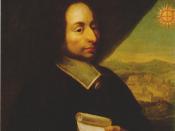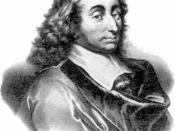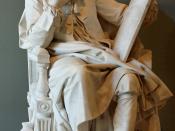Blaise Pascal
Blaise Pascal was born in central France on June 19, 1623. He was one of the
greatest mathematicians and physicists of the 17th century. He had two sisters of the name
Gilberte and Etienne who he was very close with. At the age of 3 Pascal's mother passed
away causing the family to move back to France. Pascal's father worked in the
government in which he worked with mathematics causing his son Blaise to become very
interested in them. At the age of twelve Pascal figured out the proposition of Euclidean
geometry by himself. While Pascal never did attend a university or any real formal
education, at the age of sixteen he was allowed to accompany his father on scientific
gatherings. Pascal then realized that he was a genius in mathematics and decided to
devote his life to them. Shortly there after he wrote an essay on conic sections with is
basically a part of projective geometry which can still baffle mathematicians today on
how he came to that answer at such a young age with out any formal schooling.
Pascal
then went on to invent the 'adding machine', which is now known as the calculator. He
invented the calculator for his father to figure out some financial matters when he was
appointed representative to the king of upper Normandy. Though Pascal didn't invent the
calculator we have now he did have a very basic version that was improved on many
times such as adding a computer as we have now. Another branch of math that Pascal
worked was Probability. Probability is the observing one of the several outcomes that can
occur in an event. Though Pascal found many things alone in mathematics, he did work
with Pierre de Fermat to discuss the probability of games of chance.


